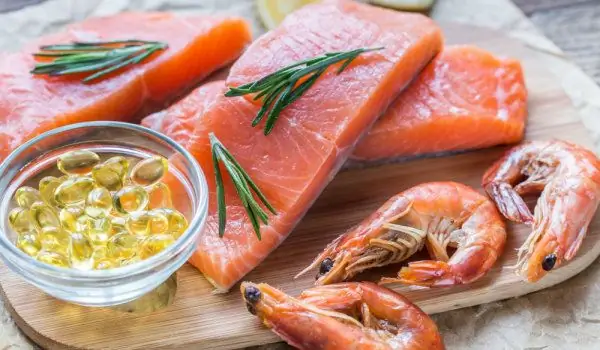2025 Author: Jasmine Walkman | [email protected]. Last modified: 2025-01-23 10:18
Fish oil is high in omega fatty acids, which play an important role in the physiological processes of our body.
They regulate the production of hormones, participate in the processes of oxygen transfer in the tissues, maintain the health of blood vessels, improve the function of the digestive tract and urinary system, normalize brain activity, prevent the development of diabetes and heart disease, reduce inflammation, increase immunity, participate in the formation of retinal membranes and neuronal membranes, reduce the intensity of pain in arthritis and osteoarthritis, improve skin condition, support the growth of lean muscle mass, suppress increased appetite and increase cognitive function of the brain.
One of the most important fish oil components is Omega-3. The effectiveness depends on its concentration. Omega-3 is a complex of essential fatty acids that our body is unable to produce on its own: alpha-linolenic (ALA), eicosapentaenoic (EPA) and docosahexaenoic (DHA). ALA is a plant product, EPA and DHA are of animal origin.
These fatty acids can be synthesized in small amounts in our body (up to 5% -7%), but this is not enough to meet daily needs. That is why it is very important to enrich your diet with foods rich in Omega-3 or to take Omega-3 in the form of food supplements.
What is the most useful fish oil?
What to look for when choosing the right supplement?
Quality of raw materials
There are two types of fish raw materials: from the back of the fish (fish body oil) or from fish liver (fish liver oil). It is not recommended to choose fish oil from the liver as a raw material, as toxic substances can accumulate in the liver and they cannot be completely removed during filtration.
Structure
The EPA / DHA percentage must be at least 60%. The quantitative ratio of EPA / DHA acids is also important, 2: 1 is considered the most effective. According to the WHO recommendation, the daily requirement of Omega-3 is from 500 to 1000 mg.
Form

Manufacturers produce drugs based on Omega 3 in 4 forms:
- Natural triglycerides are a form that occurs naturally. In our body it goes through a full and fast metabolism, that is, it is completely assimilated. The concentration of Omega-3 in them is small and such fractions do not undergo a thorough degree of purification from impurities of heavy metals. Omega-3 in liquid form is always, as a rule, in the form of triglycerides. TG marking;
- Ethyl esters are a synthesized substance resulting from the industrial processing of fish oil with ethyl alcohol to obtain a high concentration of Omega-3 in it and to purify it from toxins. This form is safer but less absorbed by the body. EE marking, ethyl esters;
- Re-esterified triglycerides. This form is resistant to oxidation. Processed raw materials are quickly absorbed and retain up to 90% of fatty acids. X-ray marking;
- Phospholipids. This is the most expensive form of krill oil. It has the highest concentration of Omega-3, is rapidly metabolized and almost completely absorbed. Another significant advantage of this form is the content of astaxanthins - powerful antioxidants. It is safe for pregnant women because shellfish do not accumulate mercury. Ph mark.
Degree of purification
Fish tend to accumulate heavy metals in their body and the larger the fish, the more toxins it contains. The pharmaceutical industry has GMP and GOED standards for quality and safety, guaranteeing a high degree of purity.
Other features
The other characteristics of types of additives with fish oil include odor, capsules or liquid form, size and type of capsules, etc. They matter because of the individual's personal preferences and tolerances. Some people find it difficult to swallow large capsules, others do not tolerate the smell and aftertaste of fish.
Some of the fish oil supplements additionally contain other components such as vitamin E, soy derivatives and others.
Which is healthier: supplements or eating fish?

The recommendation of the American Heart Association for the prevention of cardiovascular disease is to consume at least 2,100 grams of oily fish (anchovies, flounder, herring, mackerel, salmon, sardines, etc.) per week. For people with cardiovascular disease or those with risk factors for their development, at least four servings of fish a week are recommended.
When obtaining omega-3 from fish additional effects on the human body have been found that have not been reported with the use of supplements. For example, daily intake of 250-400 mg of EPA + DHA with food slows the progression of atherosclerosis, prevents heart attacks and reduces the risk of sudden death due to cardiac arrhythmias.
Consumption of 2 to 4 servings of fish per week reduces the risk of stroke by 6% and 5 or more servings per week by 12%. Fish feeding is associated with a significant reduction in the risk of recurrence and death from breast cancer, with a lower risk of developing eye diseases such as age-related macular degeneration and central geographical atrophy, and with a significant reduction in the risk of developing diabetes. retinopathy in people with type 2 diabetes.
Taking omega-3 supplements in combination with eating oily fish (3 or more servings per week) is associated with a 48% reduction in the risk of venous thromboembolism.
The above effects are observed when only oily fish is consumed. One serving of oily fish like salmon is equal in omega-3 to four servings of lean fish like cod.
It is believed that the greater number of effects on the human body when eating fish compared to taking omega-3 supplements is related to the following points:
- In addition to omega-3 acids, fish also contains other nutrients and fatty acids, which also have a positive effect on the health of the cardiovascular system;
- The ratio of DHA to EPA in most supplements is different from that in fish. In oily fish, the DHA content exceeds the EPA content (sometimes significantly), while in supplements, on the contrary, the DHA content is significantly less than the EPA content.

If fish and seafood are the only source of omega-3 for the body, then you must remember that heavy metals, pesticides and radionuclides can accumulate in fish. When a person eats a lot of fish, there is a danger of receiving a dose of toxic substances, such as mercury, dioxins or polychlorinated biphenyls. The latter two, even in low concentrations but with prolonged exposure to the body, can be carcinogenic.
IN Omega-3 supplements mercury usually does not exist because it binds to proteins, not oils. It is also known that salmon grown in artificial tanks contain several times more polychlorinated biphenyls and dioxins than wild salmon.
Due to the potential fish toxicity for pregnant and lactating women and children, it is recommended to limit fish intake to one serving per week. Prolonged use of fish oil supplements is safe as long as the daily intake is not too high and the fish oil is not contaminated. Supplements are safer than eating fish every day due to the mercury content in many types of fish.
Conclusion

The best form of fish oil depends on your needs and preferences. The main thing you need to watch is:
- Before buying food supplements, check the availability of certificates: quality and safety standards GMP and GOED;
- Pay attention to the percentage and ratio of EPA and DHA;
- Give preference to re-esterified (or re-esterified) fish oils, and if you can afford - krill oil;
- Pay attention to the composition and raw materials of the manufacturer. Give preference to small fish species caught in natural waters;
- Observe the expiry date of the medicine. If you smell an unpleasant odor, do not use the additive, as this may be due to oxidation of the product.
The choice of the recommended dose of Omega-3 is determined by the needs of your body. It is best to determine it after consulting your doctor.
To fill the necessary portions of fish per week, take a look at our delicious grilled fish offers or take advantage of the useful combination of fish and tomatoes.
Recommended:
Wing Versus Fish Oil: Which Is More Useful?

Fish oil is one of the most used, as it is a truly unique healthy product. Especially valued for its omega-3 fatty acids, it brings unprecedented health benefits. Its worthy substitute is krill oil. It is gaining more and more popularity and is about to displace it.
The Types Of Lean Fish And The Most Delicious Recipes For Them

People 's personal reasons for fasting are different. Some want to observe the Christian meaning of fasting, while others are a convenient reason to cleanse themselves of accumulated toxins. In any case, especially from today's point of view, the effort for physical and spiritual purification is a real test of the spirit.
The Most Useful Fish

The category "most useful" is attributed to many foods, most often vegetables and fruits, here and there dairy products and meat, but it seems that the fish remains a bit in the background and is somehow neglected, at least in the Bulgarian traditional cuisine.
The Truth About The Different Types Of Meat And Which Is Most Useful

Meat and meat products occupy a significant place on our table. Meat proteins have been shown to be of high biological value, as they contain all the amino acids necessary for the human body. They also contain proteins that are essential for our body, as they are a major structural component of all cells, enzymes, antibodies and most human hormones.
Castor: Corn Oil Was More Useful Than Olive Oil

Corn oil is proving to be more valuable for health than the olive oil, which is said to be the most useful fat, reports Eurek Alert. Corn oil lowers cholesterol levels more successfully than cold-pressed olive oil, say researchers who conducted the study.

